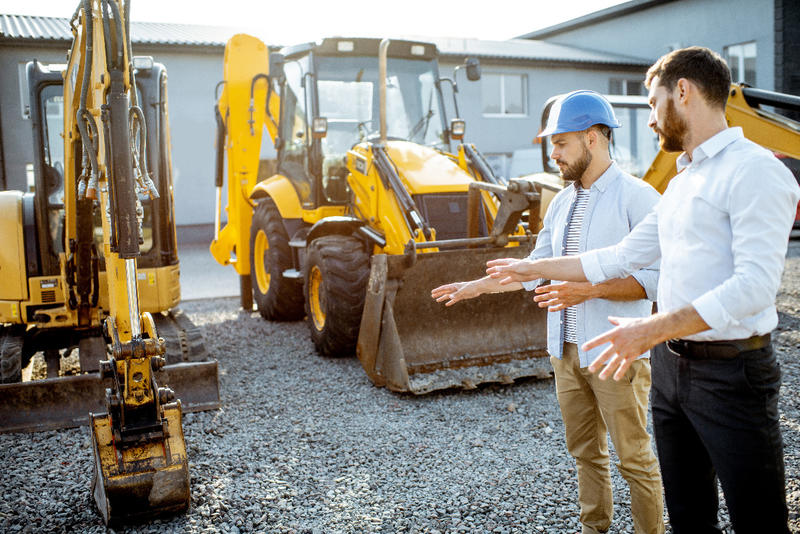Questions To Ask Before Buying From A Construction Equipment Dealer

Strong 8k brings an ultra-HD IPTV experience to your living room and your pocket.
Purchasing construction equipment is a big financial commitment that can have a big impact on your project's budget, schedule, and long-term operational effectiveness. Whether you’re a seasoned contractor or a first-time buyer, partnering with the right construction equipment dealer can make all the difference. Asking the right questions before finalizing any deal helps ensure you’re making a well-informed purchase that suits your needs and avoids costly mistakes.
What Is The History And Reputation Of The Dealer?
Before discussing models and prices, take time to research the dealer’s background. A dealer’s history in the industry can indicate their reliability and experience in the field. Look into how long they’ve been in business, what kind of projects they typically support, and what others are saying about them. Reviews and testimonies provide insight into the dealer's customer service, problem-solving, and warranty observance.
A trustworthy vendor will have a solid reputation for providing reliable goods and assistance. It’s also helpful to see if they are affiliated with industry-recognized organizations or if they hold certifications from major equipment manufacturers.
Is The Equipment New, Used, Or Refurbished?
This question might sound simple, but it’s essential to clarify. Some dealers offer a mix of new, used, and refurbished machinery, and knowing exactly what you’re buying can affect your expectations and maintenance needs. Ask for full details about the equipment’s condition, year of manufacture, and service history. For used or refurbished equipment, request maintenance logs and inspection reports to verify its performance record.
Be cautious of vague descriptions. A trustworthy dealer will offer full transparency about the machine’s condition and be willing to provide photos, documentation, or even facilitate an independent inspection.
What’s Included In The Purchase?
It’s important to ask what’s actually included in the quoted price. Some dealers may offer only the base machine, while others include essential attachments, delivery, training, or warranties. Without clarifying these details, you might end up facing unexpected add-on costs after you’ve already made the purchase.
In addition, ask whether the price includes taxes, setup, or installation services. The more you understand up front, the easier it is to compare options and make an apples-to-apples decision between multiple dealers.
What Warranty Or Guarantee Comes With The Equipment?
Warranty coverage is a crucial part of buying construction equipment, especially when reliability directly impacts your project outcomes. Ask how long the warranty lasts, what parts are covered, and whether there are any conditions or limitations.
Dealers who believe in the quality of their products are usually quick to offer solid warranties and explain them clearly. For used or refurbished machines, ask if extended warranty options are available. It’s also important to clarify who is responsible for labor costs during repairs—some warranties cover parts but not labor, which can lead to costly surprises.
What Support Services Are Available Post-Sale?
Good dealers know that the customer relationship doesn’t end after a sale. Maintaining the seamless operation of your equipment requires access to spare parts, maintenance help, and ongoing support. Ask the dealer about their support policies, how quickly they can respond to service calls, and whether they have an in-house team or rely on third-party contractors.
You should also ask if they offer preventive maintenance programs, operator training, or online troubleshooting tools. These services can greatly improve equipment uptime and reduce the risk of operational delays.
Can You Offer Financing Or Leasing Options?
Construction equipment can be expensive, and not all buyers need or want to pay the entire cost up once. Ask the dealer about available financing or leasing options and compare terms carefully. While some dealers might provide in-house payment plans, others might collaborate with financial institutions to provide attractive rates.
Understanding your payment choices early in the process can help you better plan your budget and avoid cash flow issues. If financing is offered, be sure to ask about interest rates, penalties, and whether early repayment is allowed.
What Brands And Models Do You Recommend?
While you might have a specific piece of equipment in mind, it’s helpful to hear the dealer’s recommendations based on your project goals, job site conditions, and usage requirements. A knowledgeable dealer won’t push the most expensive model—they’ll suggest equipment that truly fits your needs.
Ask about the pros and cons of different brands they carry and whether they provide training or user manuals. Getting this input helps ensure you’re buying equipment that aligns with your daily operations and is not over- or under-powered for the tasks ahead.
What’s The Dealer’s Return Or Exchange Policy?
Sometimes, even with the best planning, a machine might not perform as expected or meet your requirements. Ask the dealer what their policy is in case the equipment turns out to be unsuitable. While most dealers won’t accept full returns without a valid reason, understanding their exchange policies or restocking fees is important.
If the dealer is confident in their equipment, they should be upfront about what happens if an issue arises after the sale. A fair return or exchange policy provides an extra layer of protection for your investment.
Final Thoughts
Buying from a construction equipment dealer isn’t just about getting a machine—it’s about building a partnership that supports your long-term success. You can prevent misunderstandings, identify warning signs early, and feel more at ease knowing that you're making a well-thought-out purchase by asking the appropriate questions up front. Remember, a good dealer won’t just answer your questions—they’ll encourage them.
Note: IndiBlogHub features both user-submitted and editorial content. We do not verify third-party contributions. Read our Disclaimer and Privacy Policyfor details.




